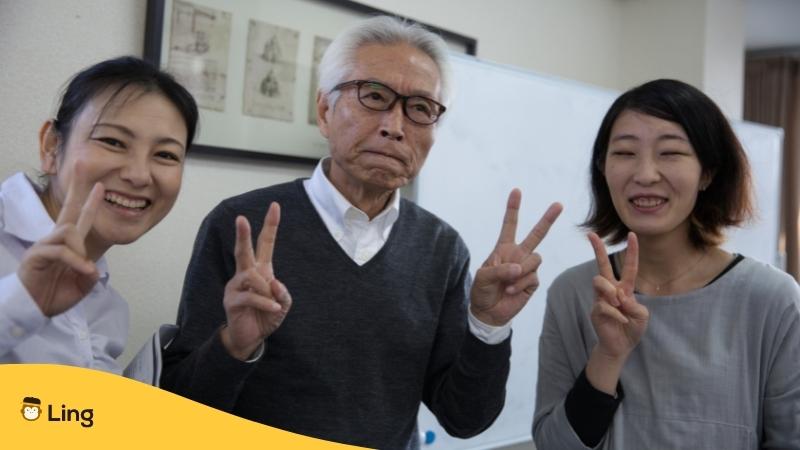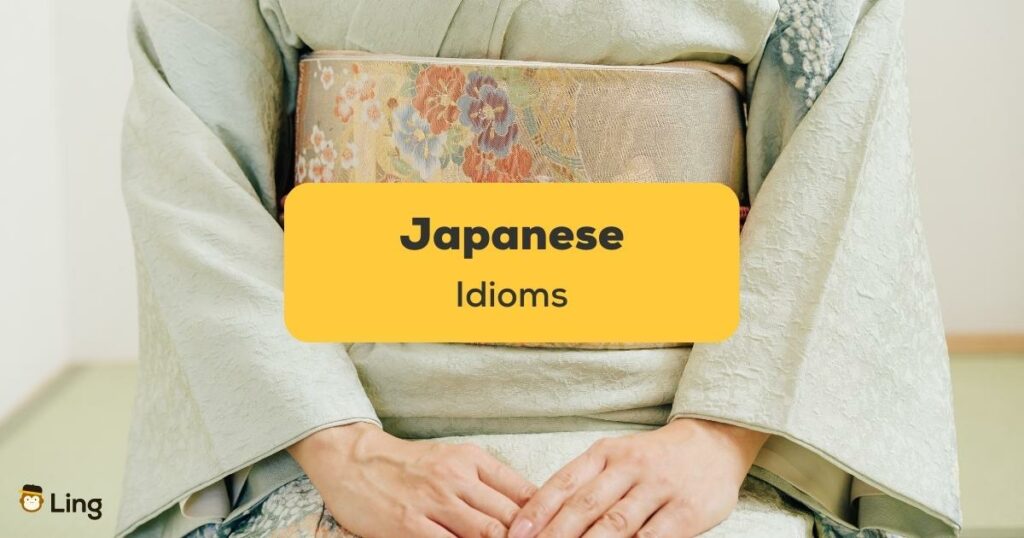Learn Japanese idioms to fully immerse yourself in the culture and communicate with native fluency. Therefore, you’ll find many options that can be immediately used in your everyday chats!
“Idiom” in Japanese is “熟語” (jukugo). For those who are highly motivated Japanese learners, we bet you’re trying to find an idiomatic phrase in Japanese to use in your conversation. Whether to make the conversation sound fun, exciting, and fluent, we agree that using Japanese idioms will help you achieve those goals. Because when you use Japanese proverbs or idioms, it’s not just about recalling them; you’ll need to be familiar with the phrase’s definition and appropriate use to demonstrate your cultural understanding.
Here, you’ll learn some great insights about the Japanese people, allowing you to understand their culture better and use Japanese idioms naturally.

Japanese People Aren’t Straightforward
Have you ever tried to ask a Japanese person a question and not fully understood their response? Of course, they did answer you, but they may have held some points in mind.
This is because Japanese culture puts great value on the context, whereas other cultures place less value on it. In high-context cultures, the message was conveyed, received, and reacted through some distinct body language without a word being expressed. Moreover, in Japanese culture, communication patterns reflect keeping the peace. In most situations, Japanese people will avoid conflict and refrain from explicitly responding negatively. Instead, the Japanese like to communicate unfavorable information indirectly.
If they don’t give you a straight response but instead use Japanese idioms, which meanings you need to interpret, it’s time to brush up on your idioms knowledge.
What Are The Top Commonly Used Japanese Idioms
Let’s get started with some common idioms in Japanese. These Japanese sayings are here to help you broaden your Japanese grammar and vocabulary!
1. Tomorrow’s Winds Will Blow Tomorrow – 明日は明日の風が吹く (Ashita wa ashita no kaze ga fuku)
This Japanese idiom expresses that you can’t know for sure what the future holds, so you shouldn’t let what occurs today affect your attitude. Instead, accept the situation and hold out for tomorrow.
2. Gold Coins To A Cat – 猫に小判 (Neko ni koban)
It’s the Japanese version of “Cast Pearls to a Swine.” One should only give gifts to people who can appreciate them. For example, giving a cat a gold coin is useless since it can’t be exchanged for anything since the cat doesn’t use money. Therefore, it’s the English equivalent of the expression “Cast Pearls to a Swine,” which means that providing something of great value to someone who has no appreciation for it’s a waste of time.
3. Even Monkeys Fall From Trees – 猿も木から落ちる (Saru mo ki kara ochiru)
Somehow, these monkeys are expected to be professional. They are, after all, doing their activities amongst trees, which is a natural habitat for them. In other words, this Japanese proverb means that even the most perfect people, now regarded as the most competent and talented in their particular specialization and have succeeded in their particular job, are nonetheless fallible and prone to making errors and failing to meet expectations.

4. One Day One Step – 一日一歩 (Ichi nichi ippo)
Inspiring words from the Japanese idiom that will motivate you to start your goal today! This Japanese idiom encourages us to move forward, even if just by a little bit each day. In other words, you need never take a giant first leap; small, consistent efforts over time will provide the same results. So always be consistent, as it is the essential thing.
5. Once A Fool, Always A Fool – 馬鹿は死ななきゃ治らない (Baka wa shinanakya naoranai)
“Once a fool, always a fool” is a literal translation of this Japanese proverb that indicates idiots can’t change till they die. Unfortunately, it’s not simple to educate someone who acts foolish because you can’t fix stupid. Thus the only death that will eventually stop this behavior. This is a common joke among friends.
6. Eight-Tenths Full Keeps The Doctor Away – 腹八分に医者いらず (Hara hachi bun ni isha irazu)
Since Japanese people tend to be in good health and live long lives, you can bet that the language has an idiom that touches on the subject. This term refers to limiting one’s food intake to no more than 80% of one’s stomach’s capacity.

Other Interesting Japanese Idioms
Here are some additional idiomatic expressions in Japanese that you can use to impress the locals.
More than just remembering these idioms, you could also start by knowing what some words and phrases mean. Most Japanese learners chose Ling to help them succeed, so why not join them? Download the Ling app from the Google Play Store and Apple App Store now, and prepare to be fluent in Japanese soon!
In Summary
Some Japanese idioms and their English equivalents share the same meaning; however, they often employ different actors or contexts to convey that meaning. You should feel comfortable using many of these idioms in everyday conversation with Japanese speakers. Afterward, you’ll better grasp the meaning behind the words said by a Japanese person from a high-context society. Learning Japanese idioms will help you become culturally and linguistically proficient.
Yet, are you interested in exploring alternative methods of studying Japanese? You need to download the Ling app immediately if that’s the case.
Learn Japanese With Ling Now!
Let’s move on to some more complicated language skills in Japanese. Ling is an excellent tool for expanding one’s Japanese vocabulary. The Ling App adapts to every type of learner, allowing you to fulfill your language-learning goals. Furthermore, the conversation with our chatbot will help you learn Japanese terms and phrases that are useful in everyday life. We have over 5 million downloads, so you know how popular and trustworthy to learn Japanese and 60+ languages with our app!
Updated by: Gwyn































































